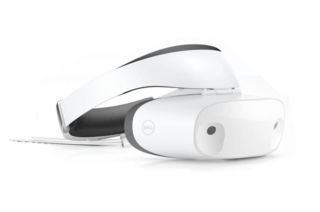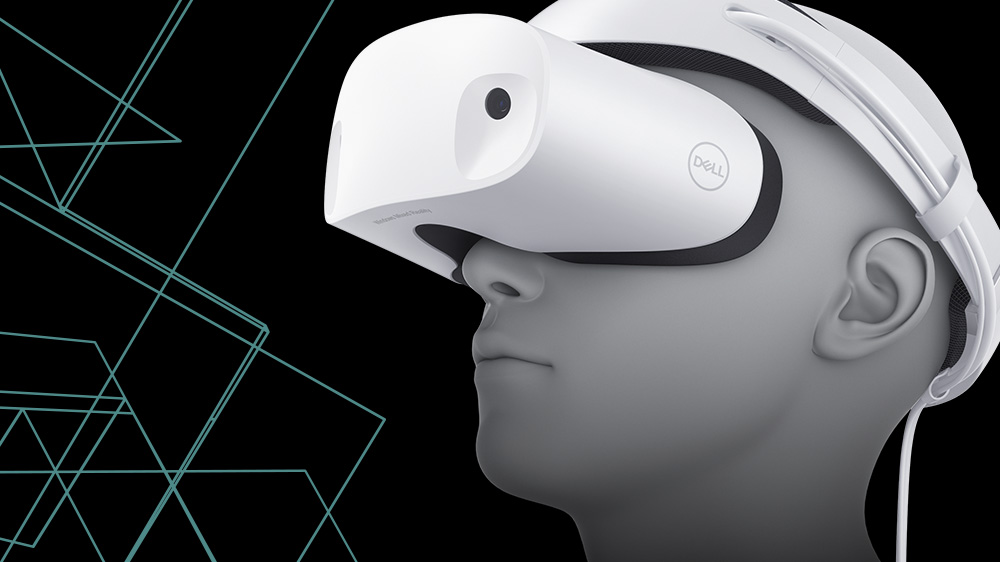Dell is forging its own path in the virtual and mixed reality world with Monday’s announcement of the Dell Visor.
The compact device is scheduled to launch in October and will cost $349.99 for the headset alone. Dual motion controllers can be added for $99.99 or users can buy everything together as a bundled package for $449.99. It will also be offered as a featured add-on accessory for Dell’s Inspiron Gaming and XPS brands.
“Whether through Inspiron Gaming, XPS or Alienware, we will have a say in VR. At Dell, we believe that VR has applications that are limitless,” Ray Watkins, technical marketing manager for Dell Gaming, told AListDaily. “So, instead of being told how and when it’s going to happen, we will help set that pace. We have a lot of people that we work with on a consistent basis and we want to make sure that we’re giving them a device that they can use to help us bring to more applications to market.”
Watkins describes the Visor as an entry-level virtual and mixed reality device costs less than an Oculus Rift or HTC Vive, and even though it might bear some aesthetic similarities to the Samsung Gear VR, the Dell Visor is not a mobile device. It connects to Windows PCs using a single cable and features front-facing cameras for augmented and mixed reality capabilities. The cameras are also used to track head movement and the two Bluetooth VR controllers, which removes the need for external sensors that other VR headsets use. Furthermore, the front visor can be flipped up, so users can switch between the real and virtual world without having to take the headset off.

According to Watkins, the Visor is for “folks who are interested in VR but want to get in at a lower price point. The companies that are currently pushing VR in the PC space—HTC and Oculus—both have products that are fairly expensive. We know through all of our market research and data that there’s definitely a sub-$400 audience, and that’s who we want to bring in to VR for the first time.”
Watkins said that the company will be taking advantage of its traditional vehicles to get the word out about the Dell Visor, including reviews, marketing activities and online advertising. The primary focus will be on gaming, and the device will be offered as an optional accessory alongside keyboards, mice and monitors for computer orders. Although there’s no word yet on whether there will be bundled pricing for systems, Watkins believes that, judging from Dell’s past practices, it is a strong possibility.
“Gameplay is obviously on the forefront because games drive most of the innovation in the consumer space,” said Watkins, discussing how the Visor will be presented to consumers. “Beyond that, there are abilities for education by having virtual classrooms, social media through virtual meeting rooms. There are a ton of possibilities for VR, and gaming and social will be the two pillars of the consumer space.”
Dell is partnered with Microsoft to host Visor-supported software exclusively on the Windows Store as opposed to selling software directly on the Dell site or through platforms such as Steam. Many of the launch titles are ported over from other platforms and they include Superhot and the zombie shooter Arizona Sunshine, with a possibility for HoloLens applications to be brought over, too.
Despite its passing resemblance to a Gear VR, Watkins pointed out that the Dell Visor is a truly a premium device.
“I don’t consider the Gear VR to be a real VR device,” he said. “It’s basically 360-degree video that’s mobile. Where I find Gear VR to be a huge benefit is on flights, where folks can watch Netflix movies and block out the outside world. We fit more in the premium space. We don’t have the same tracking abilities as the HTC or Oculus because of the way the sensors work, so the Visor sits between PlayStation VR and Oculus/HTC, but we’ll close that gap over time.”

Despite having a strong gaming focus, the Dell Visor will not be related to the Alienware brand.
“That comes down to the broadness of the Visor,” Watkins explained. “When we choose things for the Alienware brand, it specifically targets gamers and uses premium materials. By doing that, we would drive costs up way too high. By putting it into the Dell brand, it aligns with Inspiron Gaming and it can work with Dell’s general consumer products so we can all get behind it and support it. Anything you throw an Alienware moniker on is going to be gaming first, and that’s not what we want the Visor to be. We want it to be for all.”
Watkins also shared what VR means to the Dell brand.
“Dell and Alienware, as brands, always push gaming to the forefront,” said Watkins. “VR, unlike 3D TVs and glasses, is not a fad. It’s here to stay. So, instead of sitting back and allowing HTC, Oculus and other partners dictate to us how we do our own business, we’ll be able to get in and help drive innovations from our own point of view.”

